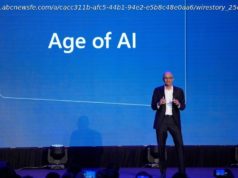Steve Hilton, a tech entrepreneur who was an adviser to former Prime Minister David Cameron of Britain, is Fox News’s first host in the liberal region.
MENLO PARK, Calif. — It’s not easy being the first and only Fox News host in Silicon Valley.
But Steve Hilton, a tech entrepreneur who was once chief adviser to former Prime Minister David Cameron of Britain, added that role to his résumé in June.
Now every week, Mr. Hilton flies from the home he shares with his high-profile tech executive wife, Rachel Whetstone, in Silicon Valley’s billionaire enclave of Atherton, Calif., to Fox’s studios in Los Angeles to host “ The Next Revolution With Steve Hilton.” Fox News markets the Sunday night program as exploring “the impact of the populist movement.”
All of which makes life complicated for Mr. Hilton in overwhelmingly liberal Silicon Valley, where supporters of President Trump are nearly nonexistent and few think populism would improve their lives.
He gets hassled for it. Recently, someone left novelty toilet paper with Mr. Trump’s face on it on Mr. Hilton’s desk at Crowdpac, the political fund-raising start-up he helped found in 2013. A vandal also took down the Trump campaign T-shirt that had been hanging on the office’s “bipartisan wall.”
Not to mention his friends. “Fox? Thank God it’s on Sunday nights, ” said Gisel Kordestani, a co-founder of Crowdpac along with Mr. Hilton. “He just keeps it separate. We all have our things.”
Mr. Hilton is unfazed. “I certainly have experienced a degree of curiosity, yes, ” he said.
This fish-out-of-water existence is the latest chapter for Mr. Hilton, 47, who was once credited as designing the modernized British Conservative image that helped get Mr. Cameron’s party elected in 2010. That was before Mr. Hilton moved to Silicon Valley in 2012, after Ms. Whetstone had taken a top communications job at Google; Mr. Hilton later turned on Mr. Cameron over “Brexit.”
For the past five years, Mr. Hilton has been quietly building a new life in Atherton, raising his two children with Ms. Whetstone, writing about how he has given up his cellphone, hosting annual Cinco de Mayo parties and tending a large flock of pet chickens (his favorite is a brown hen named Hermione) . Last year, he published a United States version of his book, “More Human, ” about the need for a populist revolution in government and business, and wrote favorably about Mr. Trump’s presidential campaign against Hillary Clinton.
Now he is Fox News’s newest host, representing its first major foray into the tech world, and the network is experimenting with Mr. Hilton’s more esoteric take on the brash Fox News style.
“Traditional television anchors might ask more shorter, pointed questions; they might try to trap their guests, ” said John Finley, senior vice president for development and production at Fox News. “Steve’s about having an intellectual discussion.”
Can it work? “We’ re in the process of finding out, ” Mr. Finley said. “It’s definitely something different.”
On a recent Sunday in Los Angeles, Mr. Hilton arrived for breakfast a little late, wearing a gray T-shirt, neon green shorts and flip-flops. He is petite but muscular, clean-shaven and with bright blue eyes. On his wrists were worn-out festival bracelets from Glastonbury and Coachella.
He had chosen one of the trendiest places in the city, Rose Cafe (with a menu featuring avocado tartine and lemonade made with tangerine oil and filtered water) , to talk populism. Mr. Hilton ordered shakshuka, beet hummus and tea with milk.
“What’s going on for half the country? Who’s lost out? The victims of elitist agenda; standing up for them, being a voice for them, ” Mr. Hilton said. “That’s the idea behind positive populism, that’s what drives the content.”
Mr. Hilton’s mission with his Fox News program, he said, is to create a working-class coalition uniting supporters of Mr. Trump and Bernie Sanders with the rage that fueled the Brexit movement.
“My argument is: Let’s blame the people who are responsible, ” he said. Those people, he added, are the “global elite.”
It’s an ironic position for Mr. Hilton to take given that he is part of that global elite — he and his wife live in a $12.5 million home in one of America’s richest ZIP codes.
But Mr. Hilton insisted he is not one of the elites he targets in his show. Over a subsequent meal in Menlo Park, Calif., he hit the table with his fist as he described how being elite “is about what you believe in — those people, I see them as my enemy. They have taken control of the levers of power.”
Some of that sense of being an outsider may come from his childhood. The son of Hungarian refugees, Mr. Hilton was raised by his stepfather, who was a construction worker, and his mother, a clerk, in the seaside town of Brighton, England. As a child, he won a scholarship to Christ’s Hospital School in Horsham, a school for children from disadvantaged backgrounds.
“He was a scholarship boy, ” said Michael Gove, a British Conservative politician. “Sheer talent brought him into that orbit, but he wasn’ t really cut from the Savile Row cloth. To call him an outsider would be an exaggeration, but he’s certainly not an insider.”
Mr. Hilton does not think his childhood was the factor. “It’s no hard-luck story, ” he said.
Mr. Hilton attended Oxford University and afterward took a job at the Conservative Central Office in 1990. Mr. Cameron was then head of the political unit, and Ms. Whetstone had joined three months earlier. In 1992, Mr. Hilton coordinated the advertising in a surprise general election in which the Conservatives won.
Over time, Mr. Hilton became Mr. Cameron’s closest adviser and godfather to his first son. With Mr. Hilton’s advice, Mr. Cameron softened his look, ditching his tie and hugging a husky on a trip to highlight global warming.
Mr. Hilton soon developed a reputation as the quirky, secretive figure behind a radically conservative agenda and was often featured in the tabloids for his casual clothes, bare feet and sweaty post-bike-ride look. In 2008, he married Ms. Whetstone.
“David Cameron was immensely able and charismatic, ” Mr. Gove said, “but it was Steve who was the idea dynamo.”
Yet by 2012, their relationship was fraying. Mr. Hilton thought Mr. Cameron was compromising too much with the European Union and moving too slowly on their vision to cut bureaucracy. The two began to drift apart, and Mr. Hilton moved to California. The fallout was complete when Mr. Hilton returned to Britain last year to campaign against Mr. Cameron in favor of Brexit. The two no longer speak, Mr. Hilton said.
When Mr. Hilton landed in Silicon Valley, he was known locally as the eccentric husband of Ms. Whetstone, who later left Google for Uber’s top communications and policy job. (She left Uber this year and has joined Facebook.)
Mr. Hilton took a teaching job at Stanford’s design school. Then he had an idea for a website that makes it easier to find and give to small-time political campaigns.
With a group including Ms. Kordestani, he formed Crowdpac, whose headquarters are in a large loft in the South Park neighborhood of San Francisco. Crowdpac scrapes publicly available data to show where candidates’ funding comes from and to score them on a scale of liberal to conservative. It also has tools for people to set up political campaigns of their own. The goal, Mr. Hilton said, is to lower the barrier to political participation.
Crowdpac, which has raised $8.5 million from investors like Index Ventures and SV Angel, has since become part of the tech world’s sometimes shaky efforts to engage with politics.
“Silicon Valley is reluctantly becoming more engaged in politics, ” said Reid Hoffman, a Crowdpac investor and a founder of LinkedIn, who recently started his own political initiative called WTF (Win the Future) . “Rather than taking the world only as we find it, Steve also imagines the world evolved.”
For Mr. Hilton, Crowdpac is where his conservative leanings stand out the most.






